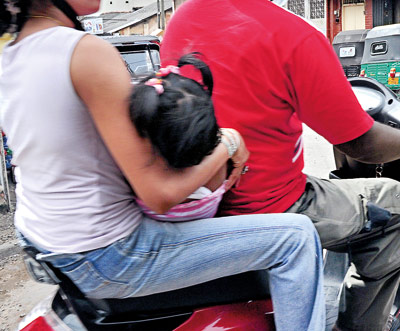News
Thousands of parents targeted in motorbike safety campaign
Police have slapped more than 39,000 stickers on motorbikes on which kids have been riding without helmets, warning parents to take greater care about motorcycle deaths the number one killer on the roads.

Inviting trouble: A family with a child without a helmet on a bike made for two
Most of these deaths are related to traumatic head injuries that can be minimised or prevented by helmets, Deputy Inspector-General of Police (Traffic) Amarasiri Senaratne said.
“A thing that sends shivers down my spine is to see whole families – two adults and two children – riding on motorbikes (at times parents wearing helmets but not the children),” Pediatrics Professor at Colombo University Dr. Harendra De Silva said.
More than 8 per cent of motorcycles carry a third passenger and more than one in hundred motorbikes (1.4 per cent) carry a fourth passenger, a “disturbing” finding, said DIG Senaratne, noting the third and fourth passengers frequently lacked helmets.
The UNICEF-aided sticker campaign was launched by the Sri Lanka Medical Association Expert Committee on Ergonomics (SLMA-ECE) as part of a broad safety awareness program.
“More than 39,000 stickers have been already pasted islandwide on motorbikes that carry children without helmets,” SLMA-ECE Chair Dr. Kapila Jayaratne said.
“Many parents take their children without helmets on motorbikes, ignoring the legal requirement and the safety of their children,” he said.
Dr. Jayaratne said the law prohibited a child under the age of two years from being transported on motorcycles because the child’s head could not adjust to a helmet and s/he would suffer severe injury in a crash even if wearing a helmet.
Wearing of helmets is compulsory under the Motor Traffic Act, DIG Senaratne said.
He noted an increase in deaths from motorcycle accidents over last year’s toll: during the first nine months of this year there were 141 deaths from 137 fatal accidents.
Dr. de Silva points out to parents that helmets can reduce the risk of serious brain injury and death.
Trauma to the brain can occur when an impact causes concussion or open skull fracture, or through a jarring motion such as a quick turn or sudden stop, he warned.
Mild head injuries, where there was no loss of consciousness, could cause permanent behavioural and cognitive problems such as memory loss, inability to concentrate, sleep disorders.
Just as important as wearing a helmet is wearing the right helmet. A helmet that does not fit properly or offer sufficient cushioning can give a false sense of security while not actually providing the level of protection needed, Dr. de Silva said.
He said perhaps finances drove decisions by parents to take one or more children with them on a motorbike but this was nevertheless illegal and dangerous.
Test your children’s sizing by having them try on a variety of helmets, the Sri Lankan Standards Institution (SLSI) advises. When fastened and tightened, the helmet should not move from side to side or front to back and your child’s forehead should be properly covered to keep it protected.
UNICEF motorcycle safety activities include a poster on preventing child injuries at various stages of a child’s life, a knowledge sharing forum including the presentation of abstracts on “Child injuries in Sri Lanka”, a program with police to encourage parents to ensure their children wear helmets, a flyer on safe pedestrian habits and police accident videos to educate children on the importance of wearing a helmet.
House to house visits are also being conducted to stress the importance of child helmets and the importance of adhering to road rules.
UNICEF-supported child injury prevention programs are continuing in the Mannar, Vavuniya, Batticaloa, Ampara and Mullaitivu districts.

